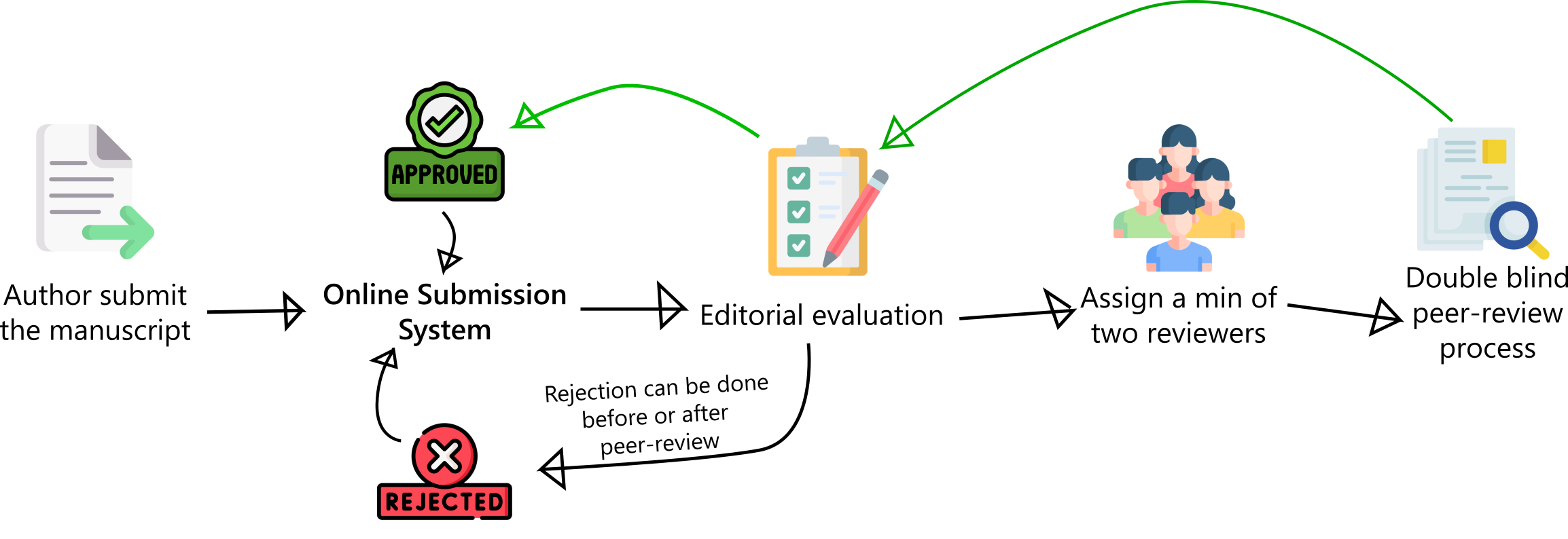Peer-Review Guidelines
This guide is intended to assist you in reviewing manuscripts submitted to ETFLIN journals. The steps that the reviewer must take are detailed so that the articles can be evaluated properly and efficiently.
SciPhar Editor
Friday, 19 May 2023

ETFLIN original image generated by AI
This guide is intended to assist you in reviewing manuscripts submitted to ETFLIN journals. The steps that the reviewer must take are detailed so that the articles can be evaluated properly and efficiently. If you have further questions, contact our Editorial Office via halo@etflin.com.
We notice that the publication process takes a lengthy time owing to the peer-review step, which has been expressed by authors to various publishers. ETFLIN's editorial and management teams have worked hard to enhance quality and optimize the time of the peer-review by implementing an online reviewing system. Ensuring the quality of peer-review is of utmost importance to us. As such, we require that all reviewers submit their comments within 10 business days. However, we understand that certain circumstances may arise that require additional time. If this is the case, we ask that reviewers communicate with us promptly to discuss any potential delays. While we prioritize timeliness, we will always prioritize the thoroughness and thoughtfulness of the review process. So, we are willing to allow for a longer duration to ensure that the peer-review process remains robust and insightful.
All manuscripts submitted to ETFLIN journals go through double-blind peer review to ensure an equitable process. This is done to prevent communication between the reviewer(s) and the author(s). Reviewers are not permitted to contact the author in any manner, you should consider the COPE Ethical Guidelines for Peer Reviewers before accepting and going through the peer-review process.
1. Affiliation: To ensure a fair and unbiased peer-review process, it is crucial to select reviewers from affiliations that are different from both the authors and each other. This practice helps maintain objectivity by minimizing potential conflicts of interest. By selecting reviewers from diverse affiliations, we can ensure a broader range of perspectives and expertise in evaluating the manuscript. Reviewers who are not affiliated with the authors and with each other can provide independent and impartial assessments, free from any undue influence or bias. This approach promotes transparency and enhances the credibility of the peer-review process, ultimately contributing to the quality and integrity of the published work.
2. Expertise: The expertise of reviewers plays a crucial role in ensuring a rigorous and insightful evaluation of the manuscript. Reviewers should be selected based on their specialized knowledge and experience in the subject matter addressed in the manuscript. This expertise enables them to critically assess the scientific merits, methodology, and significance of the research presented. By having reviewers with relevant expertise, the evaluation process benefits from their deep understanding of the field, allowing for a comprehensive and informed review. Their expertise allows them to identify any potential gaps in the research, offer valuable suggestions for improvement, and provide a thoughtful analysis of the manuscript's contribution to the existing body of knowledge. Ultimately, the selection of reviewers with the necessary expertise contributes to maintaining the quality and integrity of the peer-review process, ensuring that the published work meets the highest standards of academic rigor.
In addition to possessing expertise in the subject matter, reviewers should meet certain criteria to ensure a high level of competence and credibility in their evaluations. The following criteria are recommended for reviewers:
Advanced Degree: Reviewers should hold a Ph.D., Doctorate, or MD degree in a field relevant to the subject matter of the manuscript. This educational background demonstrates their depth of knowledge and understanding in their respective fields.
Publication Record: Reviewers should have a track record of publishing scholarly articles in reputable journals within their area of expertise. This criterion reflects their experience in conducting research, writing scientific papers, and understanding the publication process.
Field Experience: Reviewers should have practical experience and active involvement in the specific field covered by the manuscript. This could include academic positions, industry experience, or relevant research work. Their firsthand experience enhances their ability to provide insightful and informed evaluations.
Reputable Journals: Reviewers should have prior experience in publishing their work in high-impact, peer-reviewed journals. This criterion ensures that they are familiar with the rigorous standards and expectations of reputable publications, enabling them to evaluate the manuscript accordingly.
Peer-review is conducted via an online reviewing system, with a link delivered to the reviewer's email along with a peer-review request. The peer-review form includes six basic points: writing/language, research background, methodology, results and discussion, conclusion, and references. Other assessments might be added by reviewer(s) on "Other comments" input. On each basic point, a slider input is provided to score the manuscript. The score means the following:
3 = Extensive changes required
If reviewer has remarked on the manuscript file, they may leave blank comments on the peer-review form. But still, the reviewer is required to give a score on each basic point of assessment. After comments are added, reviewers are requested to make suggestions for acceptance, rejection, or revision based on the manuscript quality.
Reviewer Recognition
 ETFLIN
Notification
ETFLIN
Notification





